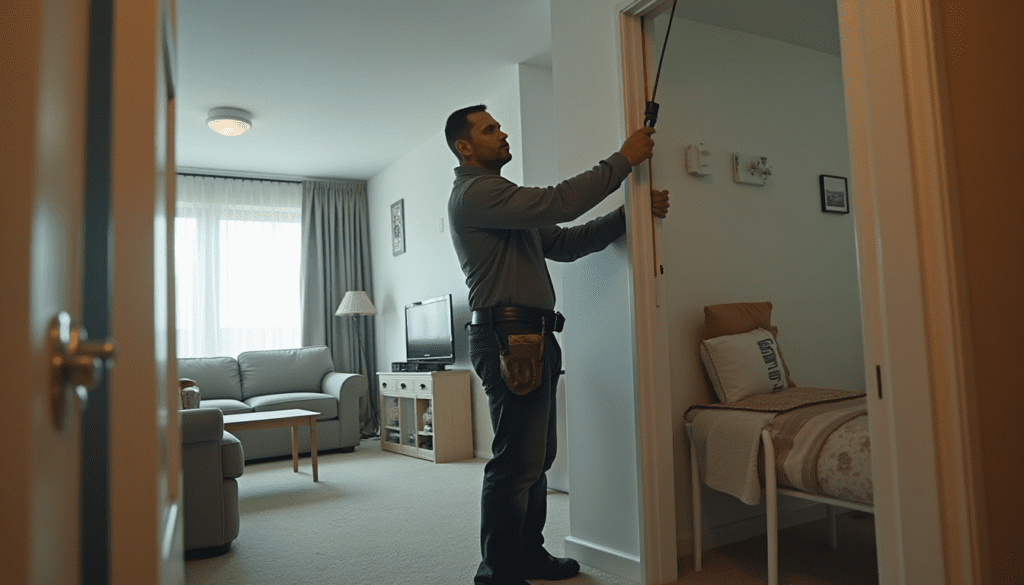Whether you’re a landlord navigating the process or a tenant trying to understand your rights, the timeline of eviction matters immensely. From your first notice to the actual removal, every day counts. For landlords, a streamlined timeline means less lost rent and fewer complications; for tenants, knowing the timeline means more time to respond, engage counsel, or correct the issue.
In the context of Belleville, NJ—where you’re operating under the laws of the state plus any local nuances—the timeline is shaped by statewide rules (for example, notice periods, court scheduling, issuance of a warrant of removal) as well as county and municipal practices. According to statewide guidance, a landlord in New Jersey must apply for the warrant of removal within 30 days of judgment for possession unless the judgment is stayed. :contentReference[oaicite:0]{index=0}
Moreover, the typical timeline from start to finish for an uncomplicated eviction in New Jersey is often quoted as 1 to 3 months, assuming no major tenant defenses or appeals. :contentReference[oaicite:1]{index=1} That means, for Belleville properties, anticipating this range ahead helps you set expectations, collect documentation early, and communicate clearly with tenants.
The General Phases of Eviction (Notice → Filing → Judgment → Possession)
Let’s break down the typical four-phase progression of an eviction process, so you can map out where and how delays may emerge.
Phase 1: Notice to Vacate or Cure
The first phase begins when the tenant falls behind on rent or violates a lease term. At this point, a landlord must serve a notice that either demands payment (or cure of the violation) or asks the tenant to vacate. This step is critical — without proper notice, a court may reject the eviction filing.
In many states, notice periods vary widely. In New Jersey, for nonpayment of rent, the landlord may proceed without a “pay or quit” period, and in other situations may serve an unconditional quit notice. :contentReference[oaicite:2]{index=2} The online guides show uncontested evictions in NJ often take three weeks to three months. :contentReference[oaicite:3]{index=3}
It’s essential for landlords in Belleville to deliver the notice correctly—both in content and delivery method—and for tenants to recognise that this phase is the moment they still may cure the default and avoid further action.
Phase 2: Filing an Eviction Action
Once the notice period expires without resolution, the landlord files an eviction complaint in court. This begins the formal legal process: the tenant must be served with the summons, and then a hearing is set. Timing here depends on court backlog and state rules.
New Jersey landlords typically file the complaint after the tenant fails to act on the notice. According to one resource, this process (filling out the complaint and waiting for court action) can take around two to three weeks. :contentReference[oaicite:4]{index=4} Because each county has its own scheduling speed, for Belleville you should check the local court’s calendar.
Phase 3: Court Hearing and Judgment
At the hearing, the judge evaluates the case, the tenant may present a defense, and then the court issues a judgment for possession if the landlord prevails. After judgment, additional steps such as a warrant of removal may follow. In New Jersey, after judgment is entered, the landlord must apply for the warrant of removal within 30 days unless delayed. :contentReference[oaicite:5]{index=5}
A national analysis shows a wide variance in state timelines — the average from filing to judgment can range from a few weeks to several months. :contentReference[oaicite:6]{index=6} For NJ, many sources cite 1-3 months overall if uncontested. :contentReference[oaicite:7]{index=7}
Phase 4: Writ of Possession and Lock-Out
Once the landlord obtains a judgment and issues the warrant of removal (also called writ of possession in some jurisdictions), the final step is the execution of that warrant: the tenant vacates, and if necessary the landlord arranges lock‐out. In New Jersey, the warrant must be executed within 30 days of issuance unless the court stay intervenes. :contentReference[oaicite:8]{index=8}
This final phase often introduces delays: scheduling with the Special Civil Part Officer, coordinating lock-out logistics, and giving the tenant the final days to move their belongings. If the tenant attempts to pay or ask for a hardship stay, the process may stall further.
How the Timeline Varies by State
While our focus is New Jersey (and Belleville specifically), helpful context comes from national comparisons. Across states, notice periods, court hearing delays, and removal execution differ significantly, and these differences highlight why timelines vary.
One overview shows, for example, that in California a typical eviction might take 5 to 8 weeks; in Colorado 2 weeks to 4 months. :contentReference[oaicite:9]{index=9} An article summarises that “provide notice to vacate” phase alone could span 3-30 days, and court hearings may take 4–6 weeks or more. :contentReference[oaicite:10]{index=10}
The major variables driving these differences include: notice requirements (how many days before filing), tenant cure rights and defenses, court backlog and scheduling, local procedural practice, and the landlord’s promptness in initiating each stage.
Key Variables That Impact Timeline
- How quickly the notice is delivered and documented
- Whether the tenant contests the case or requests extra time
- How busy the local court system is and how quickly it schedules hearings
- Whether the property is residential, commercial, month-to-month or under lease
- Local practices around warrant of removal issuance and execution
Example: Faster vs. Slower States
For illustration: in states such as Oklahoma, the eviction timeline from summons to hearing can be as little as three days in some counties, making it among the fastest in the U.S. :contentReference[oaicite:12]{index=12} On the other hand, other states routinely take several months if the tenant delays or raises defenses. The national dataset confirms wide variation. :contentReference[oaicite:13]{index=13}
For New Jersey landlords and tenants in Belleville, the comparison helps underscore that while your process may move faster than those slower states, you should still assume multiple weeks—if not months—especially if contested.
Focus on New Jersey – Standard Timeline for Landlords
Let’s zoom in on New Jersey, outlining the typical timeline you can expect, and how each step fits into the broader roadmap.
Notice Periods in NJ
In New Jersey, for nonpayment of rent situations, landlords may serve an unconditional quit notice without offering a cure period. This means the tenant has no statutory time to fix the issue before filing. :contentReference[oaicite:14]{index=14} For other lease violations, the lease terms and applicable statute may govern the notice period. Month-to-month tenants often receive 30 days if the landlord is terminating without cause. :contentReference[oaicite:15]{index=15}
Typical Filing to Judgment Time in NJ
After notice expires, the landlord files the eviction complaint. The process of filing, service, court scheduling, and judgment typically takes several weeks. According to several sources, an uncontested process in New Jersey might complete within three weeks to three months. :contentReference[oaicite:16]{index=16} During this time, tenants may respond, request hearings, or file defenses which can extend the timeline.
Execution of Eviction in NJ (Warrant of Possession)
Once the court issues a judgment for possession, the landlord must apply for the warrant of removal within 30 days. The warrant must then be executed within another 30 days unless there is a stay. :contentReference[oaicite:17]{index=17} Tenants in New Jersey may also be permitted to stay up to 3 days after being served the warrant for removal to either vacate or pay all amounts due. :contentReference[oaicite:18]{index=18}
From this perspective, for a landlord in Belleville assuming no delays, you might expect the process from notice to actual lock-out to occur within roughly 4–8 weeks. However, if tenant contestation or court backlog occurs, 10–12 weeks (or more) is realistic.
What Makes the Timeline in Belleville Different?
While New Jersey state law governs most of the eviction process, Belleville landlords and tenants should be aware of several local factors that influence how long an eviction actually takes. Belleville is part of Essex County, one of the most populated areas in the state, meaning the local court’s schedule can be busier than in smaller counties. That alone can stretch hearing dates and warrant executions by several weeks.
Local Court Practices – Belleville / Essex County
Eviction cases in Belleville are typically handled through the Essex County Special Civil Part. After filing, hearing dates are often set within two to four weeks, depending on the court’s current caseload. The court requires precise documentation—proof of service, payment records, and lease terms—to proceed efficiently. Landlords who have all documents ready often see faster resolutions.
Local officers who execute the warrant of removal also operate under scheduling constraints. Once the judgment is granted, the warrant must be submitted promptly to avoid lapsing. If a landlord misses the 30-day window to request it, the case could require a motion to reinstate, delaying the process further. Tenants in Belleville often seek additional time to relocate, and courts sometimes grant brief stays for hardship, which may add 3–7 days before the physical lock-out occurs.
Common Delays and How to Avoid Them
- Incorrect notice form or delivery: Notices that don’t meet NJ legal requirements cause dismissals.
- Incomplete documentation: Missing lease or rent ledger records slow court processing.
- Tenant hardship motions: Courts may stay evictions temporarily if tenants request more time.
- Landlord inaction post-judgment: Delays in applying for a warrant can restart the clock.
- Court backlogs: Particularly during high-volume periods (summer moves, economic downturns), hearings and officer availability can stretch beyond the norm.
For Belleville landlords, being proactive—serving notice correctly, filing immediately after expiration, and staying in contact with the court—can make the difference between a one-month and a three-month timeline.
Comparison Table – NJ vs. Selected Other States
The eviction process varies significantly across the U.S., and understanding where New Jersey stands can give landlords and tenants perspective on what’s “normal.” Below is a simplified comparison drawn from national data on average uncontested eviction timelines. Sources include iPropertyManagement and Snappt.
| State | Typical Duration (Uncontested) | Notable Features |
|---|---|---|
| New Jersey | 4–12 weeks | Strong tenant protections, requires court filing for all evictions |
| New York | 6–16 weeks | City backlog and mandatory mediation cause delays |
| Pennsylvania | 3–8 weeks | Faster small-claims style hearings |
| Florida | 3–6 weeks | Expedited for nonpayment, minimal tenant grace period |
| California | 5–8 weeks | Tenant-friendly appeals can extend beyond 3 months |
| Oklahoma | 2–4 weeks | Among the fastest timelines in the nation |
Compared to faster states like Oklahoma or Florida, New Jersey’s stronger procedural safeguards for tenants result in longer timelines. Belleville landlords should plan accordingly, understanding that the state prioritizes tenant due process.
Tips for Landlords in Belleville to Streamline the Eviction Timeline
Eviction doesn’t have to be drawn out. Many landlords extend their own timelines unintentionally by making avoidable mistakes early. Implementing the following strategies can help Belleville property owners navigate the process efficiently.
Proper Notice Delivery
Serve all notices in strict compliance with NJ law. That means personal delivery, certified mail, or another legally recognized method. Always document delivery—keep a copy, take a timestamped photo, and file a certificate of mailing. This single step prevents costly re-filings later.
Accurate Filing & Documentation
When submitting your complaint in the Essex County court, double-check that you’ve attached the lease, rent ledger, notice, and proof of service. Missing documents are among the most common causes of case dismissal or rescheduling. If you manage multiple units, create a standardized “Eviction Packet” template so each case is fully documented before filing.
Court Hearing Preparation
Arrive at your hearing with organized records—copies for yourself, the court, and the tenant if required. Judges appreciate concise documentation: a lease agreement, payment history, and evidence of notice. Professional demeanor and preparation often help move cases faster.
Understanding Tenant Defenses
Tenants have legal defenses that can delay or stop an eviction, such as improper notice, retaliatory eviction claims, or proof that the landlord failed to maintain the property. Familiarize yourself with these potential defenses so you can address them head-on. For example, documenting repair requests and maintenance logs can refute claims of uninhabitable conditions.
Many Belleville landlords partner with property management firms like RentShield Property Management to handle notices, filings, and court preparation. This can ensure compliance and reduce administrative time.
Tips for Tenants in Belleville NJ – What You Should Know
Tenants also benefit from understanding each phase of the process. Awareness can empower you to make timely decisions—whether that means negotiating payment, seeking legal aid, or preparing to relocate.
Responding to Notices
If you receive a notice to vacate or demand for payment, act immediately. Contact your landlord to discuss payment options or clarifications. Ignoring the notice accelerates the timeline toward court. Some nonprofit agencies in Essex County offer mediation that can help avoid filing altogether.
Appearing in Court
Always appear at your scheduled hearing. Failing to show up usually results in an automatic judgment for possession. If you have legitimate defenses (for example, the landlord didn’t make required repairs), present documentation or photographs. The New Jersey Courts Self-Help Center (njcourts.gov) provides free guidance materials.
Post-Judgment Options
If judgment is entered against you, you may still have limited time to act. New Jersey law allows tenants to request a brief stay (up to three days) to remove belongings or, in some cases, pay owed rent to stop eviction. Seek legal advice early—organizations such as Legal Services of New Jersey (lsnj.org) can provide free assistance to qualified tenants.
Legal and Practical Pitfalls that Delay Eviction Timelines
Evictions in Belleville and across New Jersey often face setbacks. Even landlords with airtight cases can experience delays due to administrative, legal, or human factors. Understanding these pitfalls helps both sides set realistic expectations.
- Filing errors: Incorrectly filled forms or missing affidavits can cause dismissal.
- Scheduling conflicts: Courts may reschedule hearings if either party is unavailable.
- Tenant bankruptcy filings: These can pause all eviction actions automatically.
- Stays of execution: Tenants may request additional time citing hardship or safety concerns.
- Weather or logistical delays: Bad weather or officer unavailability can postpone the physical lock-out.
Because of these potential complications, Belleville landlords should factor a buffer period into their property management planning. Communication with tenants, good documentation, and timely legal action all help minimize risk and uncertainty.
How Recent Case Law & Legislative Changes Affect Timeline in NJ
Eviction law in New Jersey has evolved significantly over the past few years, especially after the pandemic when emergency moratoriums were lifted. Belleville landlords and tenants must remain alert to updates in both state and local rules that can influence eviction timelines. Even small procedural changes can impact how quickly a case moves through Essex County courts.
One major shift occurred when temporary COVID-era protections ended in 2022. These moratoriums had caused a substantial backlog, extending timelines for many months. As of 2024 and beyond, courts have largely normalized, but the remnants of delayed scheduling can still affect busy counties like Essex. The result: timelines may remain slightly longer than pre-2020 averages.
Additionally, recent case law in New Jersey emphasizes tenant due process — requiring strict adherence to notice and filing procedures before possession judgments are granted. Even a small mistake (like an incorrect date on a notice) can nullify a landlord’s filing. Legislative updates have also strengthened anti-retaliation protections, meaning landlords must ensure their actions are strictly compliant with lease and statutory requirements.
For example, the State Eviction Laws Database notes that NJ remains among the more tenant-protective states, with mandatory judicial review for every eviction action. This commitment to fairness adds procedural safeguards—but also extends the total duration from notice to possession.
Frequently Asked Questions (FAQ)
How long does an eviction take in New Jersey?
Typically, an uncontested eviction takes between 4 and 12 weeks from the notice to final removal. However, delays due to tenant defenses, hardship stays, or court backlog can stretch this to several months.
What are the required notice periods before filing eviction in NJ?
For nonpayment of rent, landlords may proceed immediately without providing a “pay or quit” period. For lease violations or other causes, the required notice varies depending on the reason and lease type—often 30 days for month-to-month tenancies.
How does the eviction timeline in New Jersey compare with other states?
NJ is considered moderate to slow compared to faster states like Florida or Oklahoma, where evictions can conclude in under a month. NJ’s detailed due-process requirements make it slower but more predictable.
What steps must a landlord in Belleville follow to evict a tenant?
1. Serve the appropriate notice (complying with NJ law).
2. File an eviction complaint with the Essex County court.
3. Attend the scheduled hearing and obtain judgment.
4. Apply for a warrant of removal within 30 days.
5. Coordinate with the court officer to complete the physical eviction.
Can a tenant delay eviction after judgment?
Yes. Tenants may request a short stay (up to three days) after being served a warrant of removal, or longer under hardship provisions at the court’s discretion.
What happens after an eviction judgment in NJ?
After judgment, the landlord applies for the warrant of removal. The court officer serves it, granting the tenant a brief window (usually three days) to vacate. If the tenant remains, the officer performs the lock-out and returns possession to the landlord.
Key Takeaways for Belleville Landlords & Tenants
- New Jersey’s eviction process is structured, legally precise, and moderate in pace—expect roughly 4 to 12 weeks for completion.
- Local court congestion in Essex County can extend timelines, but proactive filing and complete documentation minimize delays.
- Landlords should use compliant notices and maintain clear records; tenants should engage promptly and seek legal help if needed.
- National comparisons show that NJ leans tenant-protective, emphasizing fairness and proper notice over speed.
- Staying informed about legislative updates and local court practices can save both time and expense for all parties involved.
If you’re managing property in Belleville or facing a tenant issue, understanding these steps early can reduce uncertainty and help you act strategically. Whether you’re a landlord seeking to streamline the process or a tenant needing clarity on your rights, local expertise makes a difference.
To learn more about effective property management or receive guidance from professionals experienced in the New Jersey eviction process, visit RentShield Property Management for insights, tools, and landlord-tenant resources.
Disclaimer: This article is intended for informational purposes only and does not constitute legal advice. Eviction laws and timelines may change based on court rulings or legislative amendments. For guidance specific to your case in Belleville, NJ, consult a qualified attorney or the New Jersey Courts Self-Help Center.






